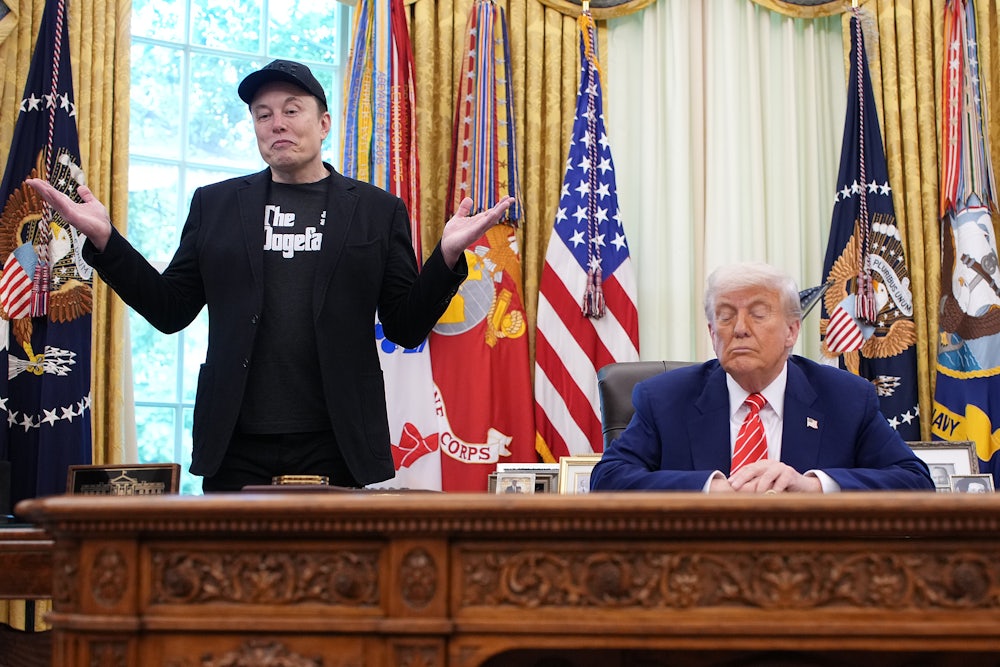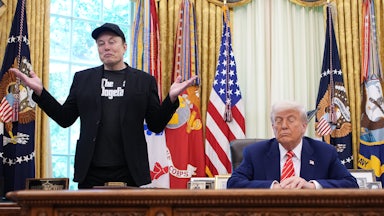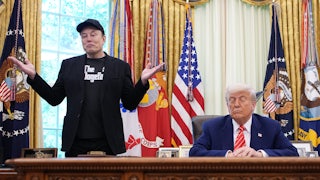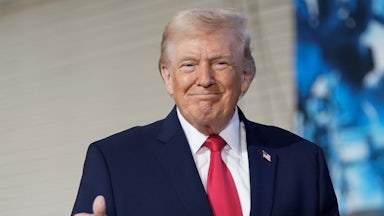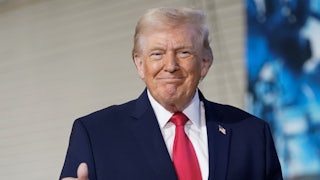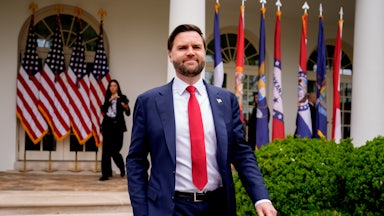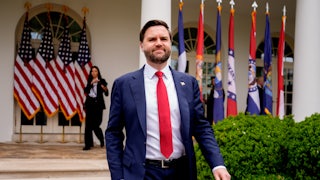As the war between Donald Trump and Elon Musk worsens, what’s truly odd about this whole spectacle is that the actual substantive disagreement between them seems to be of little interest to media observers. And when you strip away the trolling and shitposting, here’s what becomes clear: This is really a battle over how comprehensively to screw over poor and working people, largely to the benefit of the wealthy.
The superficial argument between them, of course, is over Musk’s opposition to the “big, beautiful bill” that the House passed and that Trump wants the Senate to adopt. That opposition is rooted in Musk’s claim that the bill is loaded with “pork” and will explode the deficit. Trump, meanwhile, is infuriated by Musk because he can’t brook criticism and wants the bill to pass to notch a victory.
But the respective positions underlying those stances are mysteriously missing from the whole Trump-Musk discourse. Flush them into the open, and it helps illuminate the true spectrum of the MAGA movement’s ideological goals—and why its “pro-worker populist” pretensions are so thoroughly phony.
The House GOP bill would entail a large upward transfer of resources. The bill, which would continue Trump’s 2017 tax law and add new tax giveaways for wealthy investors, heirs, and others, would deliver a big tax cut to those in the highest income brackets. According to the Center on Budget and Policy Priorities, the tax cuts enjoyed by those in the bottom 20 percent in 2027 would be one seven-hundredth the size of those reaped by the top 1 percent.
Worse, those relative table scraps for the bottom could be erased by other changes. The bill’s massive cuts to Medicaid and other health care changes would result in over 10 million people losing health insurance. Add in other cuts to the safety net, and you see why the bill ultimately would lower household resources for the bottom 10 percent while raising them for the top 10 percent—a sizable redistribution upward. As Paul Krugman notes, the bill’s “cruelty is exceptional even by right wing standards.”
Musk is angry about the $2.4 trillion those changes would add to the debt. But, crucially, he’s said little—if anything—about the role that those tax cuts for the rich would have in that outcome. He is primarily obsessed with the bill’s “pork,” meaning that he wants the bill to cut more spending—much, much more.
Where would that money come from? Musk’s cuts via his Department of Government Efficiency have already decimated foreign aid and other programs, producing more starvation, disease, and death among the global poor. Given that DOGE searched for “waste, fraud, and abuse” and found very little, if Musk wants massive additional cuts, by definition they would fall more heavily on important government programs, almost certainly ones that low-income Americans rely upon.
Another way to say this is that their real difference is over how far to push the “waste, fraud, and abuse” scam. Trump, who’s mindful of the MAGA-GOP’s image as a “working-class party,” has insisted the GOP won’t cut Medicaid and will target only fraud. That’s a lie—even some MAGA Republicans warn that the bill’s deep Medicaid cuts will hammer Trump’s working-class base and, in so doing, expose how Trump is betraying MAGA’s “populist” aura. Indeed, Trump is actively deceiving his base by pretending those cuts only target fraud. Musk, similarly, would use the “waste, fraud, and abuse” canard to absolutely annihilate the state if he could.
Which leads to an argument we keep hearing: The Trump-Musk feud reveals the deep, possibly irreconcilable strains in the MAGA alliance between the tech-bro oligarchs and the Trumpist populists. Yes, Trump and Musk do differ on things like tariffs and immigration. But on fundamental matters involving the role of the state in creating a more (or less) egalitarian future, the two men are largely in sync.
For one thing, both view the state largely as something to capture for themselves—Musk to gain support for his Promethean schemes for the future of “humanity,” and Trump to engage in world-historical self-dealing and corruption. This was neatly captured by Trump’s threat to cancel Musk’s federal contracts. Musk’s visions for space travel and electric vehicles have benefited enormously from federal support over the years. His achievements might not exist without the U.S. state. Yet Musk’s DOGE—with its assault on science, universities, and research and development—would dramatically downsize the state’s role in enabling the future flourishing of countless Americans and in keeping total immiseration and death at bay for the poorest of the poor. As Michelle Goldberg notes, the DOGE boys showed zero curiosity about who is being helped by all that foreign aid, and how.
Musk does have some sort of vision of future human flourishing. But he often talks about keeping alive the human “consciousness,” an oddly cold concept that doesn’t really depend on making the whole world a better and fairer place for living, breathing human beings. It could be kept alive by a select few—some of them on a faraway planet like, say, Mars—once the civilizational dead weight were systematically abandoned, as cutting foreign aid seems like a first step toward doing.
Meanwhile, to Trump, everything involving the state is up for corrupt horse trading and for punishing and extorting enemies. So his immediate instinct was to threaten Musk’s contracts, which Trump can only understand as a form of self-dealing by Musk—one that Trump can take away in a grand dominance display.
A helpful framework for understanding what links their worldviews comes from writer John Ganz. Neither is capable of understanding the state and political society as something that helped create the conditions that enabled their own power, wealth, and worldly achievements. These accomplishments must only be seen as a reflection of their own laudatory individual greatness.
What’s more, neither sees the state as having a meaningful role in promoting distributive fairness. This, ultimately, is what unites the tech oligarchs and MAGA: Both are deeply hostile to the social-democratic goal of using the state to promote a more liberal-egalitarian order. Both agree that the U.S. state should cut loose, literally, the worst-off people on the planet to face unimaginable suffering. Both agree that the U.S. state should dramatically roll back its commitment to providing minimal social and economic resources for lower-income Americans, including the working poor.
For Trump and Musk alike, the U.S. state provides opportunities for seemingly endless grasping and taking. It’s something to manipulate for megalomaniacal ends—though Musk imagines he’s saving human “consciousness” in doing so, while Trump is largely using it to line his family’s pockets and build chintzy gold-plated playgrounds abroad for the pleasure of the global superrich.
In the end, Musk would use deficit fears to gut the state more thoroughly than Trump would, while Trump seems more focused on dramatically reducing the tax burden of the wealthy and slashing the safety net to pay for it. They are at odds, but mainly because they merely fall at different places on the same spectrum of impulses. And those impulses all tilt toward the same place—toward making our society a less egalitarian, more unequal, meaner, crueler, and much more savage place.
